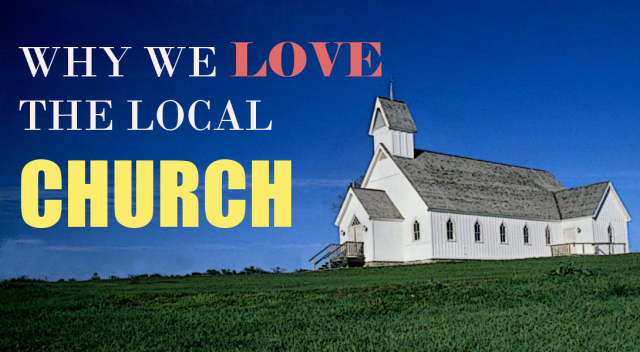*At Criswell College, we love the local church. In this first FCC Summer Blog Series, we would like to highlight a few of our professors as they explain why this is the case.

**Todays post is by Christopher Graham, Assistant Professor of Theology.
Spiritual
I love my local church; it keeps me from getting too spiritual. This, I realize, is a scandalous claim in the American evangelical community where the word spiritual is the adjectival spice applied liberally to flavor potentially bland nouns spiritual life, spiritual retreats, spiritual worship. Its ubiquity is matched in degree only by its ambiguity. Everyone uses the word spiritual but few define it except by juxtaposing it to what it is not:spiritual not worldly, not academic, not religious.
Our fascination with all-things-spiritual is not new. From its earliest days Christianity has struggled against the spiritualization of its message and practice.More than a few Christians in second-century Lyons fed up with theconundrums of this world, for example,were courted by raconteurs who promised them an escape to a purely spiritual reality. It was, indeed, just this problem that led the leader of that local congregation, Irenaeus, to write a hefty refutation against those leading his flock into the shacks of his day for spiritual experiences with the god/s arising from idiosyncratic imaginations. The anecdote to this trend, Irenaeus says at one point, is to flee to the Church, and be brought up in her bosom and be nourished with the Lords Scriptures. For the Church has been planted as a paradise in this world. (Against Heresies 5.20)
They Paved Paradise and
After surviving the parking garage of my local church, I hesitate to call First Baptist Church-Dallas paradise. But then again paradise itself is a victim of spiritualization coming to signify little more than a pleasant, typically post-mortem location for leisure and luxury. A very spiritual if not a very biblical portrait of paradise.
For early Christians like Irenaeus, the paradise of the Bible was characterized by its suitability for humanitys maturation. It was the place where God, through his Word and by his Spirit, met and transformed humansflesh-and-blood, material-and-immaterial humans. And as a result of the incarnate Word, Jesus, reuniting man to God through the giving of the Spirit, the Church then became that place of maturation. Within this Church-as-Paradise scenario, Irenaeus envisions Scripture as the agent of transformation through which God provides nourishment.
One would expect that a professor at Criswell College would key-in on a passage that highlights the ministry of Scripture. Of course, Im honored to be called upon to help individuals discover and articulate the truth that is found in Scripture. But it is at just this point that Irenaeus helps me to better understand the value of my local church in keeping me from being too spiritual in this calling.
In the world of blogs, Facebook, academic publishing, and college classrooms Im free to be a purveyor of beautifully spiritual portraits of myself and the subject matter of which I speak. In these settings there are few constraints to make sure that my claims correspond to reality. In other words, they may be spiritual but they may not be true. My local church keeps me from making (and believing) over-inflated spiritual claims that arent true. It checks me when Im tempted to spiritualize my role as a teacher or the subject matter to which I point. This is all because my local church has . . . a parking garage.
On any Sunday, the spiritual feelings generated during my spiritual worship experience evaporate in the parking garage. In the parking garage I am faced with the reality that the Ford-FXL100-Hemi-monster-way-too-large-for-a-parking-garage-who-needs-a-truck-that-big-anyway-truck and my compact sedan must share a very material and therefore very finite space in Gods good creation. Its in the parking garage that my tendency to spiritualize my prayersforgive us our trespassesconfronts my unwillingness to forgive those (the-gold-Camry-with-the-fish-on-its-bumper-that-doesnt-know-how-to-use-its-blinker-and-cut-me-off-last Sunday-morning) who trespass against us.
There is nothing spiritual about the parking garage. Except that it is precisely in the parking garage that the Spirit and the Word conspire to cultivate in me the virtues ofpeace, patience, love, kindness. (Did I mention patience?) It is in the parking garage where those who have heard me teach can observe how I negotiate the claims Ive made about the reality in which we all live.Together our righteousness and love mature within the physical, finite, fallen, and convoluted world epitomized inthe parking garage.
Id love to take you on a tour of First Baptist Church-Dallas. It is truly, as the website says, a spiritual oasis in the heart of downtown. Ill take you to thespot from which W. A. Criswell preached. Then on to the outdoor Baptistery where Dallas witnessed my childrens confession of faith last month. Ill take your kids to the childrens space designed with the help of a former imagineer for Disney. But Id really be short-changing you ifwe didnt take a spin through the parking garage. It wont be a very spiritual experience but then again, thats exactly what I love about my local Church.
Christopher writes occasional, long-winded anecdotes on Pseudoretrogracity, a blog he maintains at iamgraham.wordpress.com.
